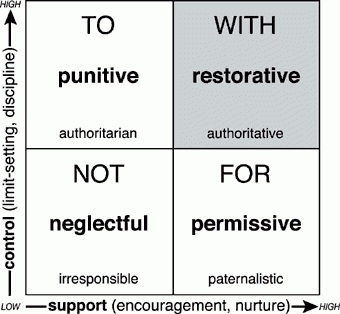To the extent possible OSCR seeks to embody Restorative Justice in all of its practices. It is one of the underlying philosophies that guide OSCR’s work in Building Trust, Promoting Justice and Teaching Peace.
What is Restorative Justice?
Restorative Justice is both a philosophy and a practice. Restorative Justice has three central assumptions (Zehr, 2015):
- When people and relationships are harmed, needs are created;
- The needs created by harms lead to obligations;
- The obligation is to heal and “put right” the harms; this is a just response.
Restorative Justice seeks to answer three questions (Zehr, 2015):
- Who has been hurt?
- What are their needs?
- Who has the obligation to address the needs, to put right the harms, to restore relationships?
Criminal justice systems in the U.S. and many institutional disciplinary systems center on what laws or rules were broken, who did it, and what they “deserve” (Zehr, 2015). Alternatively, Restorative Justice explores the questions outlined above and is more focused on the needs of those harmed, as well as those causing harm, and the community where these situations occur. It is about the people that have been impacted by a situation, how to repair harm and restore relationships.
For OSCR this means that we work WITH students to develop ways to communicate and address harm. We do this by facilitating a variety of restorative practices for students including Restorative Justice Circles. OSCR's most frequently used program is our evidenced-based process for addressing alcohol or other drug incidents on campus which is infused with restorative principles.
For more information on Restorative Justice see the following resources below. Also feel free to stop by the office and check out a book on Restorative Justice from our lending library!
Resources
- What is RJ? (Zehr Institute for Restorative Justice)
- Tutorial: Introduction to Restorative Justice (Centre for Justice & Reconciliation)
- Restorative Justice in Everyday Life: Beyond the Formal Ritual (International Institute for Restorative Practices)
- Defining Restorative (International Institute for Restorative Practices)
Works Cited
Wachtel, T. (2013). Defining restorative. Bethleham, PA: International Institute for Restorative Practices - A Graduate School.
Zehr, H. (2015). The Little Book of Restorative Justice: A bestselling book by one of the founders of the movement. New York, NY: Good Books.

